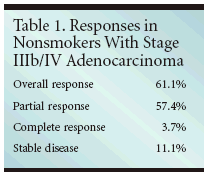Gefitinib Shows Promise in Never Smokers With Advanced Lung Adenocarcinoma
This supplement to Oncology News International includes more than 15 reportson presentations made at the 41st annual meeting of the American Society of Clinical Oncology.Reviews focus on the use of targeted agents in non–small-cell lung cancer and other solid tumors,evaluating the novel therapies bevacizumab, cetuximab, bortezomib, erlotinib, and gefitinib, aloneand/or in combination with other chemotherapy agents. Continuing medical education credit isavailable by completing a post-test and evaluation online at www.cancernetwork.com/cme.
GOYANG, Korea-Singleagentgefitinib (Iressa) appears to be avery promising treatment in Koreanpatients who have never smoked andhave advanced or metastatic adenocarcinomaof the lung, according tothe findings of a phase II trial thattested the targeted drug as first-linetherapy. The results of the trial warrantfurther study of gefitinib in thispopulation, said Dae Ho Lee, MD,who led the trial at the National CancerCenter in Goyang, Gyeonggi, Republicof Korea (abstract 7072).Drug of ChoiceThe discussant of this abstract, RomanPerez-Soler MD, chief of the oncologydivision at the Montefiore MedicalCenter, New York, called the results"very impressive," adding that he is"convinced that gefitinib was definitelythe drug of choice for this patient population."The trial enrolled 55 patients, 51 ofthem women. All had previously untreatedstage IIIb or IV adenocarcinomaand no smoking history. Twenty ofthe patients had evaluable brain metastases.Treatment consisted of gefitinibat 250 mg daily for 28 days untildisease progression or unacceptabletoxicity. Objective tumor responseswere assessed every two cycles.

Overall, 61.1% of the patients had aresponse to the drug; partial responseswere seen in 57.4% of patients andcomplete responses in 3.7% (Table 1).About 11.1% had stable disease. Ofthe 20 patients with brain metastases,12 had responses in both intracranialand extracranial lesions, and one patientwho had a "dramatic response"in extracranial lesions showed onlystable disease in intracranial lesions,Dr. Lee said. Analysis of the responsesfound no correlation with sex, performancestatus, or bronchioalveolar features.The drug showed a good toxicityprofile, with no significant hematologicadverse effects. Serious toxicitiesincluded a grade 3 rash in two patients;a grade 3 elevated liver enzymein three patients; and grade 3 asthenia,vomiting, and neuropathy, each in onepatient.Assessing EGFR StatusIn his discussion, Dr. Perez-Solersaid that one remaining question isrelated to patient selection: Wouldknowing the mutational status of thepatients' epidermal growth factor receptors(EGFRs) or numbers of EGFRgene copies help in selecting patientswho would benefit from gefitinib? "Iunderstand that these analyses will bedone," he said, "and it will be nice tosee whether [improved patient selection]can actually increase the survivalrate."To follow up on this trial, the researchershave initiated a phase IIIstudy of gefitinib vs standard chemotherapy-gemcitabine (Gemzar) andcisplatin-in this population. That trialwill include correlative studies ofEGFR mutations, Dr. Lee said.